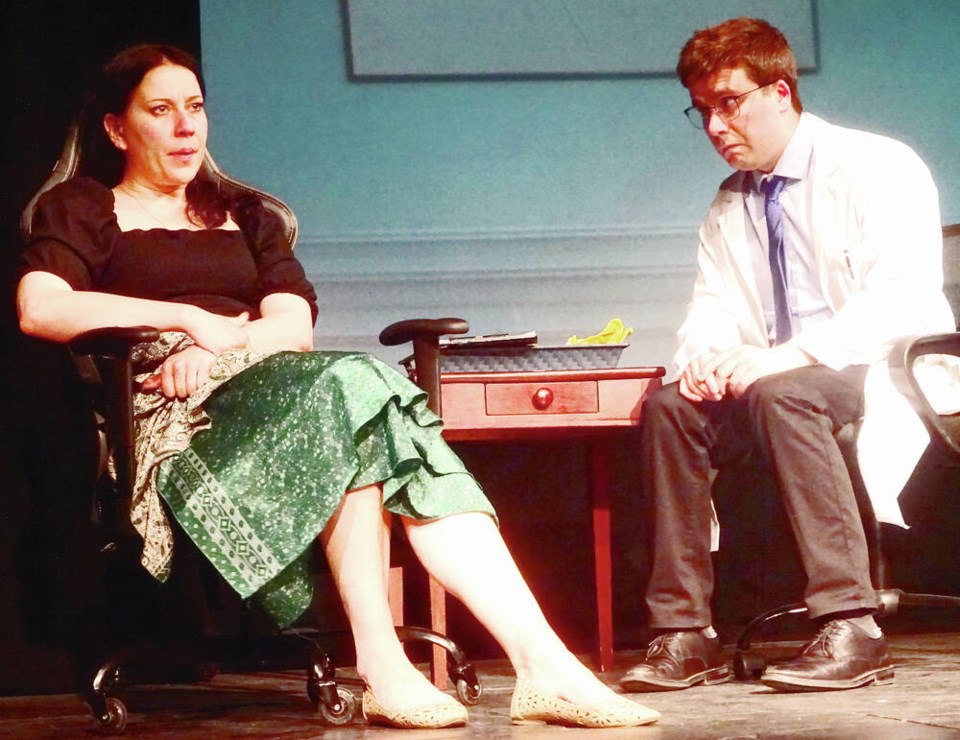The character of Mondo in Vision Disturbance is a relentless malapropism machine.
She’s a Greek immigrant who lives in Reading, Pennsylvania. Mondo has a bumper crop of problems: She’s not only navigating a messy divorce, she’s losing her eyesight.
The 51-year-old is a fighter — a gutsy woman who grapples with problems with refreshingly quirky candour. She says her soon-to-be-ex husband, a jobless hoarder, is “scum of the dirt” and a “dead beef.” When Mondo’s doctor prescribes music as a potential cure for her ocular woes, she says she owns a copy of Prince’s “Chocolate Rain” (rather than Purple Rain).
Connoisseurs of pop-culture weirdness will recognize this as a winking nod to Tay Zonday’s Chocolate Rain, a celebrated example of outsider music. Somewhat like Zonday’s peculiar ditty, Christina Masciotti’s Vision Disturbance is a left-field, deeply human acknowledgement of half-forgotten outsiders punted to the margins of society.
Theatre Inconnu has just opened a strong production of this 2010 black-humour romp that shimmers with Beckett-like strangeness. Sharply observed, well-directed and acted, Vision Disturbance revels in the oddness of life, offering plenty of humanity and a soupçon of hope while sidestepping easy or clear-cut solutions.
Mondo (Ursula Szkolak) visits her optometrist (Nolan Fidyk) because it’s become difficult to see out of her left eye. Losing depth of vision is giving her migraines and making her life topsy-turvy. Dr. Hull notices two spots on her retina are threatening to impair her optic nerve. His prescription: Listen to Bach’s Magnificat. This musical balm, he says, may alleviate the stress which no doubt caused Mondo’s impairment.
Pragmatic Mondo responds with irritation — she need a fast cure, not a song list. She’s already got plenty to deal with. Medical problems aside, her good-for-nothing hubby is a hoarder who collects baby-on-board stickers as well as broken cars and computers. For some reason, the divorce court judge has sided against her, even ordering Mondo to clean up her husband’s junk-stuffed new abode.
When she returns to Dr. Hull for a followup — hoping for medicine or surgery — he merely recommends a dose of Beethoven’s Egmont Overture.
The good doctor has his own problems. Dr. Hull suffers from a back ailment so severe he’s taken to gobbling handfuls of painkillers. Like Mondo, he’s experiencing a fundamental shift in his perception of the world triggered by physical impairment.
Dr. Hull’s drug-addled state leads to an even more unorthodox medical treatment. He takes Mondo through a course of therapeutic “guided imagery” (complete with musical soundtrack) that causes her to hallucinate about sunflowers and an invasion of flies.
Both actors are strong in this engaging two-hander, directed with clarity by Wendy Gail. On Thursday night, Szkolak — employing a Greek accent convincingly — captured Mondo’s mix of feistiness and exasperation while navigating a world that’s bewildering, isolating and occasionally beautiful.
The apt eccentricity of Mondo’s idiomatic speech is beyond that of the average immigrant struggling with a new language. Playwright Masciotti presents this lopsided way of speaking (which Szkolak manages with vivacity and clarity) as a metaphor for life’s arbitrariness and strangeness.
Fidyk portrays Dr. Hull with equal persuasiveness. There’s the button-down doc who takes in Mondo’s rants with detached professional nods. And there’s the character’s turbulent inner world, which occasionally erupts like lava spurts.
We first encounter the latter when Dr. Hull asks a lawyer to do pro bono work for Mondo’s divorce. When the doctor receives a terse rejection over the phone, he responds with the F-word and then a deadpan: “Turns out he was too busy.” Here Fidyk’s comic timing was impeccable.
His gift for humour was also apparent when Dr. Hull confronts a horrible meal at a local diner. The description of this — complete with spewing waitress — is hilarious.
Jason King’s sound and projections, including evocative videos, add immeasurably to the proceedings. On this particular night random flickers occasionally flashed across the screen. I was told this was purely unintentional, yet (oddly) it helped, serving to the mirror the play’s title and themes.
Some may find Masciotti’s ending a touch too romantic-comedy-esque. If so, I’m not among them — to me it seemed a fitting denouement for an enjoyably acerbic and unconventional night of theatre.
Well worth seeking out, Vision Disturbance continues to May 18 at Theatre Inconnu.



